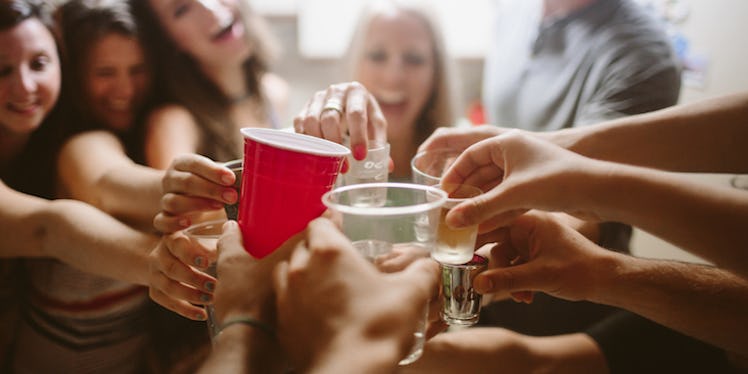
This Is Why You Tend To Wake Up With Bruises After A Night Of Drinking
Along with the dreadful, painful, bordering-on-psychedelic hangovers I used to get when I was a drinker, I remember I would also often wake up with bruises on my body after a night of heavy drinking.
That's right -- my arms and legs were so spotted with blacks and blues, I was basically a human cheetah.
I'm kind of prone to bruising as it is (got a few mystery ones on my arms as we speak), but long nights filled with beers and vodka sodas would usually take this sh*t to the next level.
And as it turns out, I was really not alone in this.
In fact, alcohol causes lots of people to bruise more -- and not just because you're more prone to falling when you're drunk.
Alcohol happens to be something called a vasodilator, which causes, you guessed it, vasodilation.
This means it's a substance that actually relaxes the muscular walls of the blood vessels and allows more blood to flow to the skin and tissues -- aka a blood thinner.
That vasodilation also happens to be responsible for the flushed sensation of heat you sometimes get in your face when you drink.
But when you bruise, your vessels are literally injured or broken in a sense, and blood pools around those vessels and rises to the skin.
Because there is more blood at the surface of your skin when you drink, when those blood vessels break, it makes it that much easier to create the beautiful visual effect of a good ol' black-and-blue.
That blood thinning also plays a role in why your heartbeat starts to feel a little extra after a gin and tonic or two.
What you're technically experiencing there is a drop in your blood pressure, which causes the heart to work a little harder than usual to pump blood to the rest of your organs.
Plus, the alcohol also affects other parts of your body, including the spleen, your bone marrow, and of course, the liver -- all of which impact the production of blood platelets, which are those very important things that bind together to repair damaged vessels.
And, not for nothing, it really is true that alcohol can affect your motor skills, and even your memory.
And that's especially true when it comes to heavy drinking.
The alcohol affects your cerebellum, which is responsible for coordinating your movements -- a pretty big job, wouldn't you say?
So, if you find yourself constantly waking up after a night of drinking plagued with both a hangover and a fresh set of new bruises, perhaps you should take it as your cue to ease up on the vodka sodas -- just a little bit.